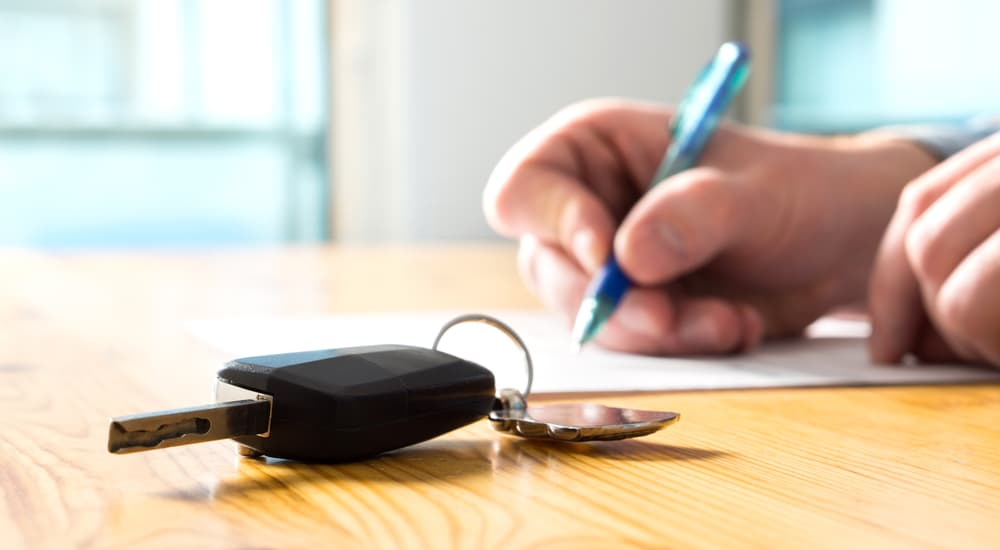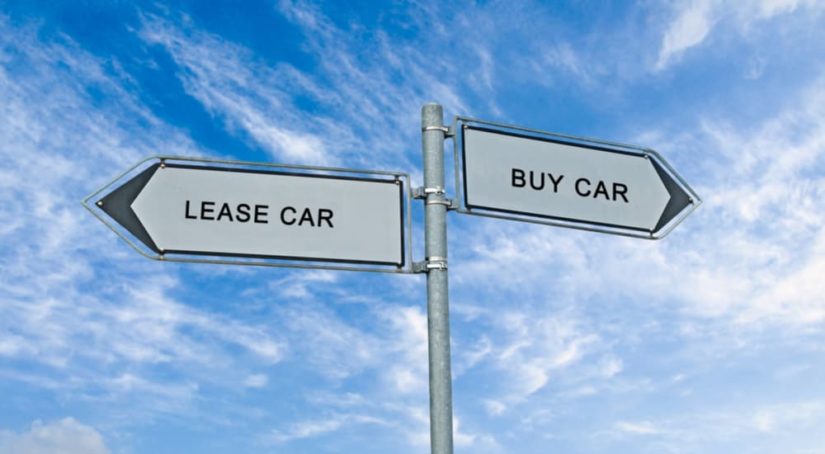Car loans can seem intimidating to first-time auto buyers. Cars can be expensive, so you might be signing up to be on the hook for a significant amount of money. On the other hand, the conditions of a complex lease agreement can also be overwhelming. Both loans and leases require monthly payments and give you access to vehicles you couldn’t afford if you had to pay out of pocket, but what is the difference between them and which one is right for you? Financing a car can be confusing, so we’re going to give you some simple explanations that can help you figure out the pros and cons of each.
What Is a Lease?
A lease is an agreement that lets you drive a new vehicle for a fixed period of time (usually between two and four years). Typically a lease requires a down payment upfront followed by smaller monthly payments over the course of the lease’s term. At the end of the lease, you usually have the option to either return the car to the dealership or purchase it yourself.
There are also some contracts that allow for lease takeovers. This basically means that the person who originally leased the vehicle passes it on to someone else, who takes control of the car and takes over the payments. For the original leaseholder, this can be a convenient way to get out of a lease early (perhaps due to a move or sudden need to downsize) without having to pay off the remainder of the lease payments or incur other penalties.
The person taking over the lease has fewer costs upfront since they don’t need to make the down payment. In the right circumstances, this can be a win-win for all involved. But if you are taking over a lease, you need to inspect the vehicle first to ensure you aren’t inheriting a car with serious damage or excessive wear and tear that you will be held responsible for when the lease ends.
What Are the Benefits of a Lease?
The monthly payments for a lease are typically, though not always, lower than the monthly payments for an auto loan on an equivalent new car. Leasing can appeal to people who like to stay up-to-date with all the latest automotive technology since it allows you to change cars regularly every few years. It can also appeal to people who aren’t sure what type of car is right for them and don’t want to commit long-term to a particular model. Once your lease is up, you can switch to a car that’s larger, smaller, sportier, or more fuel-efficient––whatever best suits your needs.

What Are the Disadvantages of a Lease?
Since there’s a good chance you’ll be returning your vehicle once the lease term is up, lease contracts often have restrictions that incentivize you to keep the car in good condition. One extremely common condition is a mileage cap, which means that you agree to drive less than a certain number of kilometres (usually around 20,000) each year of the lease. If you have a long commute or like to take big summer road trips, you might end up paying a fine at the end of your lease term.
You can also run into charges for damage like scratches, dings, and rips in the upholstery. So before you enter into a lease agreement, be prepared to keep your car in good shape for a few years. And make sure you understand the agreement before you sign on. You don’t want to get surprised by a fee that you didn’t know about upfront, so always work with a trusted financing expert who can walk you through the particulars of your contract and make sure it’s right for you.
What Is a Loan?
With a loan, instead of borrowing a vehicle for a fixed term, your payments are going toward your eventual ownership of the vehicle. Basically, you borrow the money you need to pay in full for the car, and then you pay that money back over time, plus interest. Loans can have different lengths, interest rates, and monthly payments, so you’ll want to sit down with a financial expert and figure out which plan works best for your budget. Once you pay off the loan, you will own the car outright.
What Are the Benefits of a Loan?
While leasing is almost always just for new cars, you can get a loan to finance either a new or used car. This opens up your options to more affordable choices, not to mention models that have been discontinued by automakers but are still beloved by drivers, like the Honda Fit. You also have more freedom when it comes to the condition of your car. You can add after-market accessories, decorate the vehicle however you like, and not worry too much when it comes to minor scratches and dings. Of course, all of these things can still affect the resale value of your car down the road, but you won’t incur a direct fee like you would with a lease agreement. And once you own the car, you can use its resale value as equity toward the purchase of your next vehicle.

What Are the Disadvantages of a Loan?
Monthly loan payments tend to be a bit higher than monthly lease payments. Of course, as we mentioned, loans give you the freedom to explore more affordable used options, so you might actually end up getting similar or lower payments with a loan. However, if you want to drive a brand-new car and take advantage of the latest automotive technology, then a lease may be the more affordable choice.
Advantages of Both Loans and Leases
While loans and leases have their differences, there are a few advantages they have in common compared to paying for a car out of pocket. For one, financing a car makes it easier for people to afford nicer, newer cars than they could if they were limited to those they can pay for upfront. This means you can get cars that will last longer, retain their value better, and come with more modern safety features. The monthly payments you make toward loans and leases can also help you build up your credit score, which can get you better rates on loans in the future and can certainly come in handy for more significant financial decisions, like buying a home.
At the End of the Day, Both Have Their Place
Loans and leases are both great tools for financing a vehicle, and each has its own strengths. Leases are preferable for people who always want to drive a relatively new car and don’t want to commit to any one vehicle long-term. Loans are better for people who want to settle down for a while with a car and build up equity that they can use toward a future purchase somewhere down the line.
Either way, financing a car can seem daunting if you’ve never done it before, especially if you’re new to the world of credit. While there are a lot of factors that most contracts have in common, each one is unique, and you’ll want to make sure that you fully understand what you’re agreeing to. So whether you decide to go with a loan or a lease, make sure you talk things through with a financial expert and ask any questions you have. As long as you are well informed and make your payments on time and in full, financing can be a great tool to help you afford a reliable car that can get you where you need to go in safety and style.



